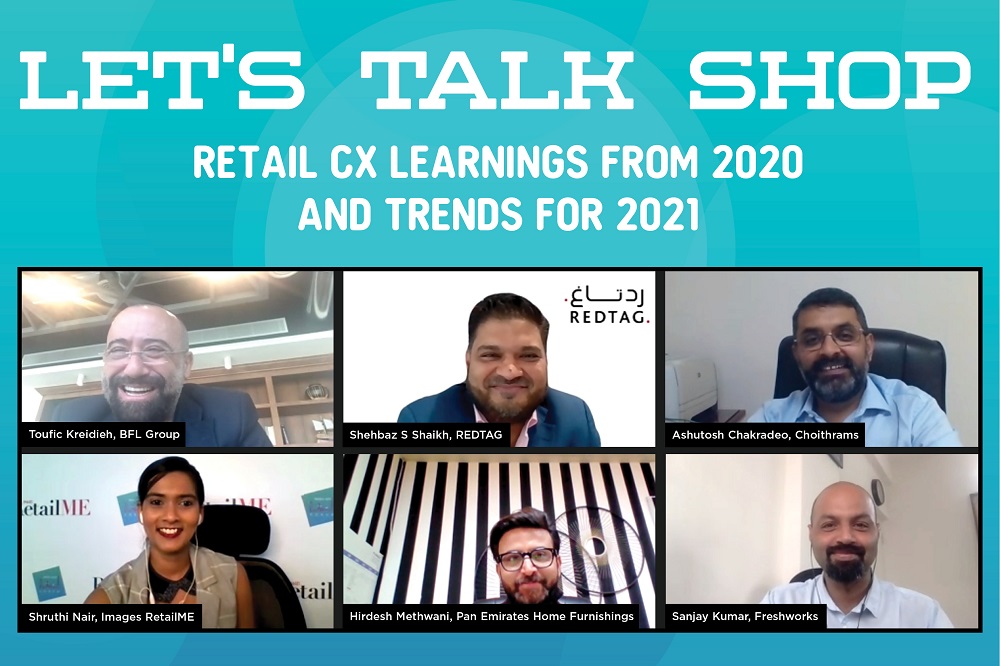A recent study found that companies with US$1 billion annual turnover can add US$700 million within three years of investing in customer experience
Retail sales in the UAE are expected to rebound and grow by 13 percent to reach $58 billion by the end of 2021;
The UAE currently leads the Middle East and North Africa (MENA) region in terms of household spending on e-commerce at US$2,554 per household;
UAE retail sales are forecast to maintain 6.6% annual growth in the medium term to reach $70.5 billion by 2025;
A recent study found that companies with US$1 billion annual turnover can expect to earn an additional US$700 million within three years of investing in customer experience.
The UAE currently leads the Middle East and North Africa (MENA) region in terms of household spending on e-commerce at US$2,554 per household, which is twice the value of the global average of US$1,156, according to a report by Dubai Chamber of Commerce and Industry.
COVID-19 has accelerated digital transformation in the UAE and the MENA region – shifting from the traditional brick-and-mortar to omnichannel retail, like the rest of the world, while online shopping has picked up fast since the lockdown in March last year, said experts at a conference titled ‘Let’s Talk Shop’, organised by Images RetailME in association with Freshworks, a customer service and solutions software business that aims to create a customer-for-life engagement platform.
Shruthi Nair, Executive Editor, Images RetailME, opened the conference, saying, “The term ‘At your fingertips’ isn’t just a phrase anymore. We now have access to a lot of things at just the click of a button. As shoppers, we are spoilt for choice and channel, making the job that much harder for every brand and retailer to grab our attention and earn our money.
“This expanded choice landscapehas shifted customer expectations, resulting in a new type of modern buyer – one that is more aware and knowledgeable of their purchases, one that expects to be satisfied with not just their purchases, but also with their entire shopping journey and also one that is willing to pay more for a better experience.”
During the lockdown the retail sector witnessed a massive transformation in customer behaviour.
Retail sales in the UAE are expected to rebound and grow by 13 percent to reach $58 billion by the end of 2021, supported by pent-up consumer demand in the second half of the year, Covid-19 vaccination efforts and Expo 2020 Dubai, new analysis from Dubai Chamber has projected.
A recent study found that companies with a US$1 billion annual turnover can expect to earn an additional US$700 million within three years of investing in customer experience.
Freshworks recently surveyed 1500 CX professionals across the globe and released some of theirfindings.
“Customer expectations have increased last year. 63 percent of the customers have seen a rise in expectation through the crisis, and this is very important. This is a number which is changing the whole scenario of how things are moving. “Additionally, 56 percent of customer service leaders have seen an increase in the budget compared to 2019,” Sanjay Kumar, Marketing Head, Middle East & Africa, Freshworks, told the webinar.
“Take your service to the customer with “Digital CX” by adopting emerging channels SMS, Whatsapp, Facebook Messenger, Apple for Business chat etc. which allows proactive service delivery and ‘anytime engagement’.”
“With increase in customer queries and expectations, “To Bot or Not” is not a question anymore. Bots are your great first line of defence and ensures 24/7 service availability,” he added.
The analysis, based on recent data from Euromonitor, predicted that UAE retail sales are forecast to maintain 6.6percent annual growth in the medium term to reach $70.5 billion by 2025, with store-based retailing growth forecast at a CAGR of 5.7 percent, while non-store retailing is forecast to grow at a CAGR of 14.8 percent.
The grocery retail sector was under massive strain ahead of and during the lockdown period, which forced them to accelerate their digital adoption and omnichannel offerings to ensure that the essential supplies are reaching its customers without delay.
Ashutosh Chakradeo, Head of Retail, Choithrams said, “During this pandemic a lot of things just fast-tracked. It’s not like digitalisation was not part of our strategy from 2015 to 2019, but the pandemic escalated it.
“Online business has jumped during the COVID-19 period, from say, 10 percent to 50 percent for some retailers”
Toufic Kreidieh, CEO of BFL Group says that digital is the future of any industry and if retailers can increase online sales to up to 50 percent of their revenue, they will be on the right track.
He said, “We upgraded the online business, which was already there before the pandemic and was only 8 percent of our business, but today it’s 27 percent of our turnover.”
“We were able to open 11 big stores during 2020. Now we have another 14 stores in the pipeline. We are extremely positive now as we know that revenge shopping, revenge spending, and revenge travelling is going to happen.”
Customers are putting a lot more emphasis on value. And the increased focus on value means a brand has to deliver multiple positives.
Shehbaz S. Shaikh, CEO of Redtag, thinks it’s high time for brands to deliver an emotionally uplifting and memorable shopping experience where the customer feels that the brand is truly going above and beyond their expectations.
“A big trend we’ve seen for sure is physical footprints are going down and the digital interactions are increasing,” he said.
“Earlier, customers used to step in the store, try their apparels before they make the purchase. But today, we are seeing a big shift towards digital experiences. Loyalty is very important, so if a customer feels that she/he doesn’t belong, they have got a lot of options and a lot of places to go to.”
From Personalisation to Hyper-Personalisation
Personalisation plays a big role. The retail industry now needs to be customer-centric, offering personalised experience to attract customers and gain their loyalty. The time lag between discovery and purchase is a constant pain point for a customer.
Speaking about digitalisation, Shehbaz Shaikh said, “We created a digital catalogue through WhatsApp, Instagram and Facebook, and got an extremely good response.This was for all GCC countries, beside Saudi Arabia. But in Saudi Arabia, due to the sheer size of our customer base, we launched our e-commerce site. And it reinforced the brand identity as a business that goes the extra mile for the customers.”
Brands are trying to reach out to the customers through various means of digital advertising and attract them with offers and promotions.
Hridesh Methwani, Head of Marketing at Pan Emirates Home Furnishings, said, ‘Dubai is a promotion-driven market. Across all brands, within every industry, there are people who are reaching out with different kind of promotions.”
Hyper personalisation in digital websites makes a brand get closer to its customers, understand their needs better and as a result, serve them better.
“Today’s customers need hyper personalisation addressing specific customer needs. If you are looking for a particular item, that should be the one point of discussion rather than discussing any other product,” he added.
Although the retail industry is moving towards digital, brick-and-mortar will always have its place in the Middle East as the customers in this region love to go out for shopping. According to Jones Lang LaSalle, a global real estate advisory, Dubai saw 110,000 square metres (sqm) of gross leasable area (GLA) in the retail sector completed in 2020, which brings the emirate’s total retail stock to 4.2 million sqm.
“We cannot negate the fact that people want the best shopping experience. They want to touch and feel and try stuff. No matter what you do through technology, you cannot replace the experience of stepping into a store. So, I’m still positive that, probably in a couple of year’s time, people will be back to their normal life, and will be comfortable going out,” said Hridesh Methwani.
At the end of the day, the digital, physical, multichannel and omnichannel experiences need to all be centred on the ever-evolving customers. The retailers who understand and cater to their customers’ best will lead the way.
The virtual roundtable is a series of such initiatives by RetailME – to reflect on the changing market dynamics of the region’s retail industry.

